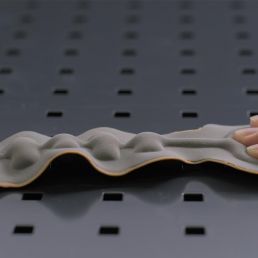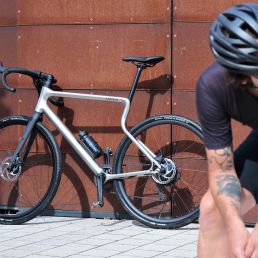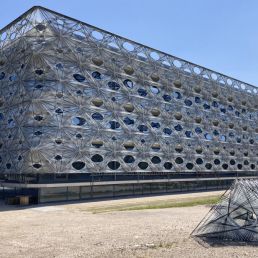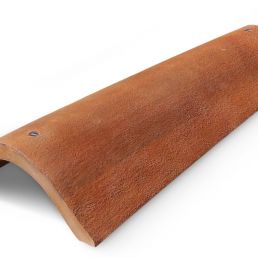
Natural fiber reinforced car seat
hybrid material concepts and tailor-made manufacturing processes
22 October 2023
As part of the Innovation Campus Future Mobility ICM, researchers are focussing on the use of sustainable materials in mobility solutions of the future. The focus of the project “Design for Recycling” is a seat shell that is made from different natural fiber reinforced plastics (NFRPs) in order to significantly reduce the ecological footprint. Therefore, different aspects of the product life cycle are targeted.
NFRP with load-optimized carbon fiber reinforcements
Researchers from the Karlsruhe Institute of Technology provided the design and identified the areas where local carbon fiber reinforcements need to be applied. Lightweight construction experts from the Institute of Aircraft Construction at the University of Stuttgart bring the know-how of hybrid material concepts and tailor-made manufacturing processes to the project.
In this, NFRP are manufactured with load-optimized carbon fiber reinforcements. The computer-aided optimization takes into account the general conditions of processability and recyclability. For the development of the supporting structure, Rhino 7 was used in combination with a topology optimization plug-in. In this way, a load-adapted structure was generated within the specified construction space.
In the next step, the fiber paths were extracted and projected as cut outs on the 3D-model of a core. Then, this core was completely made of stacked cardboard pieces. Two major advantages come with this material. On the one hand, well established recycling processes exist for cardboard and on the other hand, the cardboard softens when in contact with water. This enables to wash out the core after production to create big and lightweight 3D structures.
In this case, the supporting structure was produced by winding pre-impregnated carbon fiber rovings on this core. The strong and open carbon fiber grid represents the lightweight aspect of fiber reinforced composites with minimal use of this synthetic and expensive material. At the same time, the natural fiber reinforced seat structure shows the capabilities of this renewable material which can be locally produced and bond CO2.
The project was funded by the Baden-Württemberg Ministry of Research and Science as a part of the project “Design for Recycling” in the Innovation Campus Future Mobility. The team led by scientist Johannes Baur was responsible for carrying out the research work.
image source: Johannes Baur (IFB, University of Stuttgart)
Ecoblaq molecular wood colours
23 March 2024
Ecoblaq is a molecule manipulation method, a natural chemical reaction, making…
Natural fiber-reinforced lightweight design and vibro-acoustic metamaterials
10 October 2023
At the ELMIA Subcontractor in Jönköping, Fraunhofer LBF is showing promising…
MotorSkins morphing textiles
19 April 2022
Berlin based start-up MotorSkins designs and produces textiles with embedded…
3D Pioneers Challenge 2022
15 December 2021
The 3D Pioneers Challenge 2022 adresses tech pioneers who pave the way for…
IGNIS – Light from waste heat energy
12 August 2020
The availability of affordable, independent and, above all, clean electrical…
Brake disc with reduced fine dust
21 April 2021
Fine dust endangers our health. One of the main sources is traffic, especially…
Texoversum
15 July 2023
With the "Texoversum", Reutlingen University has put into operation a training…
Invisible Terracotta Solar Rooftile
10 May 2023
The family-run business Dyaqua has developed a technology to integrate a…
Xarvio – Digital Farming
8 January 2021
BASF Digital Farming GmbH has received the renowned Crop Science Award for the…








